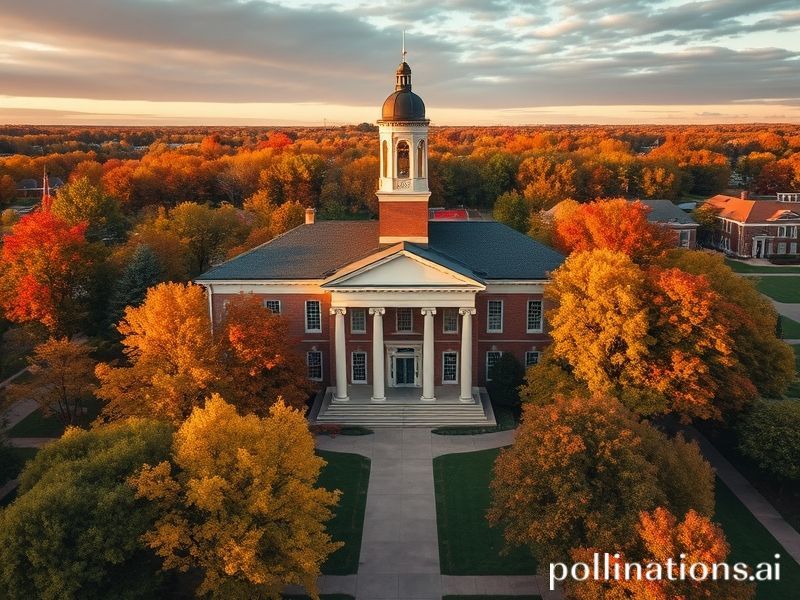Hillsdale College: The Tiny Michigan Town Exporting Conservative Revolution to the World
From the Ruins of Rome to the Cornfields of Michigan: Hillsdale College’s Global Curriculum of Small-Town Defiance
By our Special Correspondent in Existential Exile
HILLSDALE, Michigan—To most of the planet, this town of 8,000 souls is a cartographical shrug, a speck somewhere between Detroit’s rust and Chicago’s skyline. Yet step onto the neo-Gothic campus that styles itself “the conservative Harvard” and you discover a miniature think-tank empire that exports ideology the way Switzerland exports discreet banking: quietly, efficiently, and with an air of moral superiority that suggests everyone else is cheating on the test.
Founded in 1844 by Free Will Baptists who disliked slavery almost as much as they disliked government hand-outs, Hillsdale has spent 180 years perfecting the art of saying “no.” No to federal funds, no to affirmative action, no to the creeping social-democratic malaise that, in its view, begins with subsidized student lunches and ends with Venezuelan hyperinflation. The college’s refusal to accept a dime of Title IV aid—rendering it ineligible for Pell Grants, federal loans, and, presumably, the Department of Education’s commemorative tote bags—turns it into the geopolitical equivalent of a hermit kingdom, albeit one where the Dear Leader quotes Cicero and the national sport is competitive Latin recitation.
From an international standpoint, Hillsdale’s significance lies not in its quaint brick façades but in its worldwide syndicate of influence. Its free online courses—“Constitution 101,” “Great Books 102,” “Why Regulation Is Basically Theft 103”—have been streamed in 178 countries, proving that nothing travels faster than a lecture on limited government filmed in 720p. The college’s Imprimis newsletter, translated into Spanish, Mandarin, and even Arabic, lands in 5.5 million inboxes monthly, making it arguably more widely read than the Paris Climate Accord, though admittedly less likely to reduce global temperatures.
Across the Atlantic, European populists quote Hillsdale lecturers the way medieval monks cited Augustine. In Brazil, President Bolsonaro’s education minister once brandished a Hillsdale policy paper as if it were a crucifix against Marxist vampires. Meanwhile, in Hong Kong, democracy activists circulate Hillsdale lectures on natural rights—ironic, given that the college’s own bylaws would probably classify Hong Kong’s street barricades as an unacceptable federal overreach.
The faculty roster reads like a conservative Comic-Con: Antonin Scalia’s former clerks, Soviet dissidents turned tenured philosophers, and at least one lapsed Marxist who now describes Che Guevara as “the Instagram filter of guerrilla chic.” Their syllabi treat the Federalist Papers as holy writ and regard the European Union as a cautionary tale on the dangers of letting Belgians design anything larger than a waffle. International students—currently 7 % of the student body—receive a crash course in American exceptionalism and a complimentary pocket Constitution. Upon graduation they are shipped back home as ideological sleeper agents, armed with Montesquieu and absolutely no student debt, courtesy of Hillsdale’s donor base of Midwestern millionaires who consider taxation a character flaw.
Critics, of course, dismiss the college as a fever dream of 18th-century cosplay. They point to its curriculum—where Jane Austen is studied more rigorously than climate science—as proof that Hillsdale is preparing students for a world that exists primarily in oil paintings. Yet global politics keeps rewarding its worldview. When Italy’s new right-wing government wanted a crash course on dismantling administrative agencies, whom did they call? Not Brussels, but a professor who grades papers beneath a portrait of James Madison.
Meanwhile, the college’s sprawling Kirby Center in Washington, D.C., functions like an embassy for the Republic of Classical Liberalism, hosting cocktail receptions where senators toast “ordered liberty” and interns whisper darkly about the Fed. One can almost picture a future UN where delegates from Hillsdale, Vatican City, and Singapore exchange knowing nods while everyone else argues about carbon credits.
So here we are, in an era when multinational corporations speak the language of stakeholder capitalism and every NGO champions “global governance.” Against that backdrop, Hillsdale College stands as a gleefully anachronistic insurgent, a tiny Midwestern acropolis convinced that Athens fell because someone subsidized the olive oil. Whether its gospel of small-government maximalism saves Western civilization or merely provides intellectual cover for the next oligarch’s tax cut is, naturally, above my pay grade. But watching the college beam its sermons into Lagos living rooms and Warsaw cafés, I’m reminded that history’s loudest revolutions often begin in the quietest zip codes—preferably ones where the Wi-Fi is strong enough to stream a lecture on the Tenth Amendment.







